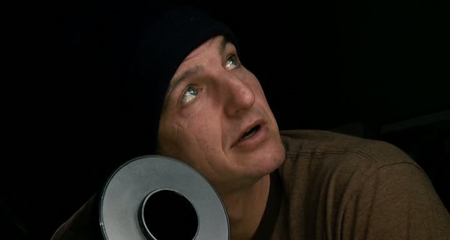Instead it
took a very short post to intrigue me, but then the film stayed there for years
before I decided to watch it.
It is an
independent film, so don’t expect amazing special effects or a large cast,
but at the same time you can rest assured that you’ll be amazed, because, being
released from the logic of blockbusters, which must be a success to cover the
enormous costs to produce them, independent films (a bit like the works
of independent musicians or independent authors) have the privilege of being
able to dare.
The film is
directed by Mark Cahill, a little-known director of three
independent films (of which this is the second one).
The role
of the female protagonist is entrusted to Brit
Marling, who
later starred in such films as “Arbitrage” (in which she played the
daughter of Richard Gere and Susan Sarandon) and “The Company You Keep”
(Robert Redford).
The male
protagonist is played by William Mapother, whom TV series fans will remember
as Ethan Rom in “Lost”, but who hangs about big cinema
productions, although in smaller roles, since 1989.
At first
glance the plot would seem that of a science fiction film or more generally of a
film that is part of the speculation fiction genre, reminding of “The
Twilight Zone”.
A habitable
planet identical to Earth is discovered, and it is approaching. They
call it Earth 2, for simplicity. However, its being identical to the
Earth doesn’t only apply to its shape. This fact should be already enough to
scare all the inhabitants of our planet and make them believe they are victims
of a collective hallucination, instead, in a kind of surreal atmosphere, people
seem just curious. But what makes this discovery even more incredible is the
fact that, after four years, when the two planets are in communication
distance, they realise that Earth 2 seems to have the same inhabitants of
Earth.
Are they
living the same life?
In this
context you are shown the story of Rhoda Williams, who on the night of
the first sighting of Earth 2, when she is a bit tipsy after a party, is
driving a car while trying to see the new blue dot in the night sky and, in so
doing, she causes an accident in which two people dies and one ends up in a
coma.
I don’t
tell you what will happen later, because the beauty of this film is to follow
the unpredictable turn of events. Indeed, I have already revealed too
much.
Suffice to
say that it is a dramatic, redemption story, which uses an imaginative
context to address the topic of second chances.
Can
there be a second chance for a person who has made such a horrible act that
even she cannot forgive herself?
Rhoda tries
to discover it as she puts back together the pieces of her life and try to make
amends, but things don’t go exactly the way we had expected.
In about 90
minutes we follow her with bated breath, only partly interested in the
story of second Earth, but the latter will prove crucial to the conclusion
that is consumed in the last 10 minutes of the movie, leaving us
dumbfounded as we think about it for a few minutes. Or for some days, as it
happened to me.




No comments:
Post a Comment